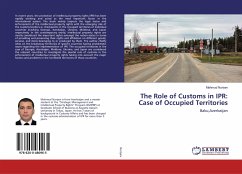In recent years, the protection of intellectual property rights (IPR) has been rapidly evolving and acted as the most important factor in the international system. The book mainly inspects the legal status and enforcement of the intellectual property rights with the emerging role of the customs borders or checkpoints in the occupied territories of individual countries involving Georgia, Azerbaijan, Ukraine, Moldova, and Japan respectively. In the contemporary world, intellectual property rights are mostly considered the important rights amongst the nation-states in terms of providing and preserving their rights and affiliation on different goods, services, and items belonging to or produced by them. The author chiefly relies on the breakaway territories of specific countries having problematic issues regarding the implementation of IPR. The occupied territories in the case of Georgia, Azerbaijan, Moldova, Ukraine, and Japan are considered the relevant countries to investigate the pivotal role of customs in the enforcement of intellectual property rights taking into account the major factors and problems in the conflicted territories of those countries.








